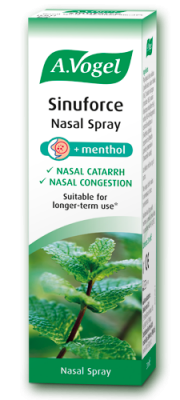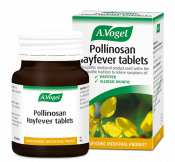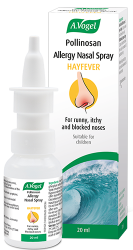What is non-allergic rhinitis?
Allergic rhinitis is caused by the immune system over-reacting to allergens like pollen and dust. As a result, the membranes lining the nose can become irritated and inflamed, causing too much mucus to be produced. This can then drip down the back of the throat or block the sinuses. Plus, in response to an allergen, histamine production also increases which leads to symptoms like inflammation of the nasal passages and itching.
Non-allergic rhinitis is similar in that it too causes issues like swelling and congestion. However, the two conditions differ a little in terms of their causes because, as the name suggests, the symptoms of non-allergic rhinitis are not the result of an allergen. Instead, the problem can come about for a whole range of reasons.
What causes non-allergic rhinitis?
There is no definitive cause for non-allergic rhinitis however, there are many factors that can contribute to the problem.
Weather
Everyone has mucous membranes lining the inside of the nose that regularly produce mucus to help trap dirt and other things that may be harmful to the body. However, the weather sometimes affects this organised system which can result in the symptoms associated with non-allergic rhinitis. Moving from air that’s warm and humid, to air that’s very cold for example, can cause the membranes inside the nose to swell. This in turn leads to problems like a runny nose and congestion. Humid air can also dry out the nose and may again lead to the symptoms of non-allergic rhinitis.
Environment
The surrounding environment can have a significant impact on the nose and therefore on non-allergic rhinitis symptoms too. There are for example, a variety of things that can make symptoms of this condition worse such as things outdoors like smog, smoke, exhaust fumes, solvents, and aeroplane fumes. Indoor factors like dust, smoke from cigarettes, strong smells like perfume and air fresheners make also impact symptoms.
Occupation
Your occupation may also contribute to the problem of non-allergic rhinitis because, if you are exposed to chemical fumes for example, this could cause irritation.
Colds and Flu
The most common cause of non-allergic rhinitis is a viral infection as a cold or flu attacks the lining of the nose and the throat to cause problems like a runny nose.
Medication
Occasionally, prescribed medications like aspirin, ibuprofen and medications for high blood pressure can cause non-allergic rhinitis.
Hormone Changes
Non-allergic rhinitis can also be caused by hormonal changes during pregnancy, puberty, menstruation, oral contraception use or in other hormonal conditions such as hyperthyroidism.
What are the symptoms of non-allergic rhinitis?
During a bout of non-allergic rhinitis, the blood vessels inside the nose expand and fluid builds up in the tissues of the nose. This then results in the main symptoms of the condition - congestion and a runny nose. However, these problems are often accompanied by a more uncomfortable set of issues as well, such as:
- Sneezing
- Nasal pressure
- Reduced sense of smell
- Irritation or discomfort in the nose
- A crust develops inside the nose which may smell unpleasant and cause bleeding
These problems are very similar to what we’d experience during a cold or flu however, here the symptoms don’t seem to get better and are often deemed chronic.
As mentioned, there are also some similarities between allergic rhinitis and non-allergic rhinitis but nevertheless, the latter does not usually involve problems like an itchy nose, eyes or throat – these are instead exclusive to the problem of allergic rhinitis.
Risk Factors
Irritants
Being exposed to irritants like smoke, smog and exhaust fumes may increase the likelihood of developing non-allergic rhinitis.
Fumes
The condition may also be triggered by exposure to certain fumes in the workplace such as solvents, chemicals and construction materials.
Women
Hormonal changes increase the likelihood of allergic rhinitis developing so women are more at risk as such changes are common during pregnancy and menstruation.
Health Problems
Issues such as hyperthyroidism and chronic fatigue syndrome are known to sometimes cause or worsen non-allergic rhinitis.
Stress
For some people, emotional or physical stress may trigger the condition.
Complications
Nasal Polyps
These are abnormal sacs of fluid that grow in the nasal passages and sinuses due to chronic inflammation. Small polyps aren’t particularly damaging but larger ones can block the air flow through the nose which makes it difficult to breathe.
Sinusitis
This is an infection in the membrane that lines the sinuses and is caused by pro-longed nasal inflammation.
Middle Ear Infections
Congestion and increased fluid in the nose may lead to middle ear infections.
Treatment for non-allergic rhinitis
Non-allergic rhinitis, although not overly harmful, does involve an uncomfortable and irritating set of symptoms. However, there are a few things you can do about this.
Avoid Triggers
It’s not always an easy task, but if you are able to identify the things that cause or worsen your symptoms, you can then attempt to avoid them. This may help to ease the problem so that you are able to continue your day-to-day life as normal.
Herbal Assistance
To address the symptoms of non-allergic rhinitis, you could try our Sinuforce Nasal Spray which provides relief for nasal congestion and catarrh. Unlike traditional nasal sprays, it leaves the protective function of the mucous membranes intact. However, by including menthol it still helps to soothe the nose and reduce swelling in the nasal mucous membranes.
Invest in a Humidifier
It may be worthwhile investing in a humidifier as this increases moisture in the air to help counteract the effects of central heating systems which dry out the air. This may help to loosen mucus to help with congestion.
Visit Your Doctor
It can be difficult to diagnose non-allergic rhinitis but if symptoms are beginning to affect you day-to-day life, it may be time to visit your doctor to get some further advice. They’ll be able to do a blood test to check if you have the allergy and will then discuss your options from there.










